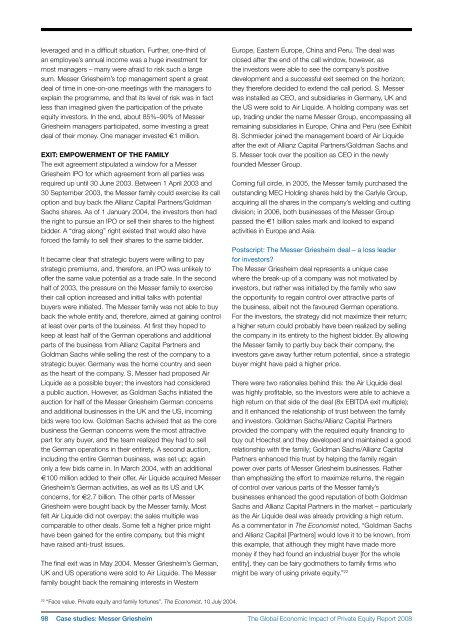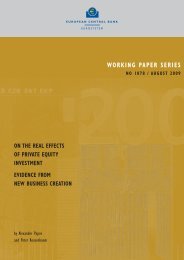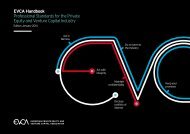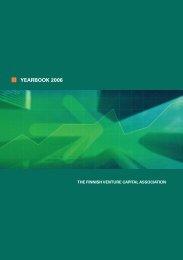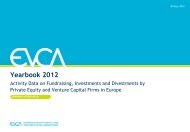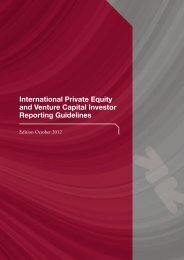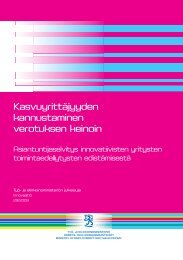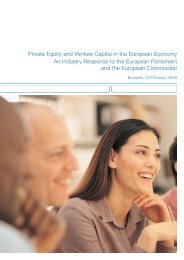The Global Economic Impact of Private Equity Report 2008 - World ...
The Global Economic Impact of Private Equity Report 2008 - World ...
The Global Economic Impact of Private Equity Report 2008 - World ...
- No tags were found...
You also want an ePaper? Increase the reach of your titles
YUMPU automatically turns print PDFs into web optimized ePapers that Google loves.
leveraged and in a difficult situation. Further, one‐third <strong>of</strong>an employee’s annual income was a huge investment formost managers – many were afraid to risk such a largesum. Messer Griesheim’s top management spent a greatdeal <strong>of</strong> time in one‐on‐one meetings with the managers toexplain the programme, and that its level <strong>of</strong> risk was in factless than imagined given the participation <strong>of</strong> the privateequity investors. In the end, about 85%–90% <strong>of</strong> MesserGriesheim managers participated, some investing a greatdeal <strong>of</strong> their money. One manager invested €1 million.Exit: empowerment <strong>of</strong> the family<strong>The</strong> exit agreement stipulated a window for a MesserGriesheim IPO for which agreement from all parties wasrequired up until 30 June 2003. Between 1 April 2003 and30 September 2003, the Messer family could exercise its calloption and buy back the Allianz Capital Partners/GoldmanSachs shares. As <strong>of</strong> 1 January 2004, the investors then hadthe right to pursue an IPO or sell their shares to the highestbidder. A “drag along” right existed that would also haveforced the family to sell their shares to the same bidder.It became clear that strategic buyers were willing to paystrategic premiums, and, therefore, an IPO was unlikely to<strong>of</strong>fer the same value potential as a trade sale. In the secondhalf <strong>of</strong> 2003, the pressure on the Messer family to exercisetheir call option increased and initial talks with potentialbuyers were initiated. <strong>The</strong> Messer family was not able to buyback the whole entity and, therefore, aimed at gaining controlat least over parts <strong>of</strong> the business. At first they hoped tokeep at least half <strong>of</strong> the German operations and additionalparts <strong>of</strong> the business from Allianz Capital Partners andGoldman Sachs while selling the rest <strong>of</strong> the company to astrategic buyer. Germany was the home country and seenas the heart <strong>of</strong> the company. S. Messer had proposed AirLiquide as a possible buyer; the investors had considereda public auction. However, as Goldman Sachs initiated theauction for half <strong>of</strong> the Messer Griesheim German concernsand additional businesses in the UK and the US, incomingbids were too low. Goldman Sachs advised that as the corebusiness the German concerns were the most attractivepart for any buyer, and the team realized they had to sellthe German operations in their entirety. A second auction,including the entire German business, was set up; againonly a few bids came in. In March 2004, with an additional€100 million added to their <strong>of</strong>fer, Air Liquide acquired MesserGriesheim’s German activities, as well as its US and UKconcerns, for €2.7 billion. <strong>The</strong> other parts <strong>of</strong> MesserGriesheim were bought back by the Messer family. Mostfelt Air Liquide did not overpay; the sales multiple wascomparable to other deals. Some felt a higher price mighthave been gained for the entire company, but this mighthave raised anti‐trust issues.<strong>The</strong> final exit was in May 2004. Messer Griesheim’s German,UK and US operations were sold to Air Liquide. <strong>The</strong> Messerfamily bought back the remaining interests in WesternEurope, Eastern Europe, China and Peru. <strong>The</strong> deal wasclosed after the end <strong>of</strong> the call window, however, asthe investors were able to see the company’s positivedevelopment and a successful exit seemed on the horizon;they therefore decided to extend the call period. S. Messerwas installed as CEO, and subsidiaries in Germany, UK andthe US were sold to Air Liquide. A holding company was setup, trading under the name Messer Group, encompassing allremaining subsidiaries in Europe, China and Peru (see Exhibit8). Schmieder joined the management board <strong>of</strong> Air Liquideafter the exit <strong>of</strong> Allianz Capital Partners/Goldman Sachs andS. Messer took over the position as CEO in the newlyfounded Messer Group.Coming full circle, in 2005, the Messer family purchased theoutstanding MEC Holding shares held by the Carlyle Group,acquiring all the shares in the company’s welding and cuttingdivision; in 2006, both businesses <strong>of</strong> the Messer Grouppassed the €1 billion sales mark and looked to expandactivities in Europe and Asia.Postscript: <strong>The</strong> Messer Griesheim deal – a loss leaderfor investors?<strong>The</strong> Messer Griesheim deal represents a unique casewhere the break‐up <strong>of</strong> a company was not motivated byinvestors, but rather was initiated by the family who sawthe opportunity to regain control over attractive parts <strong>of</strong>the business, albeit not the favoured German operations.For the investors, the strategy did not maximize their return;a higher return could probably have been realized by sellingthe company in its entirety to the highest bidder. By allowingthe Messer family to partly buy back their company, theinvestors gave away further return potential, since a strategicbuyer might have paid a higher price.<strong>The</strong>re were two rationales behind this: the Air Liquide dealwas highly pr<strong>of</strong>itable, so the investors were able to achieve ahigh return on that side <strong>of</strong> the deal (8x EBITDA exit multiple);and it enhanced the relationship <strong>of</strong> trust between the familyand investors. Goldman Sachs/Allianz Capital Partnersprovided the company with the required equity financing tobuy out Hoechst and they developed and maintained a goodrelationship with the family; Goldman Sachs/Allianz CapitalPartners enhanced this trust by helping the family regainpower over parts <strong>of</strong> Messer Griesheim businesses. Ratherthan emphasizing the effort to maximize returns, the regain<strong>of</strong> control over various parts <strong>of</strong> the Messer family’sbusinesses enhanced the good reputation <strong>of</strong> both GoldmanSachs and Allianz Capital Partners in the market – particularlyas the Air Liquide deal was already providing a high return.As a commentator in <strong>The</strong> Economist noted, “Goldman Sachsand Allianz Capital [Partners] would love it to be known, fromthis example, that although they might have made moremoney if they had found an industrial buyer [for the wholeentity], they can be fairy godmothers to family firms whomight be wary <strong>of</strong> using private equity.” 2222“Face value. <strong>Private</strong> equity and family fortunes”. <strong>The</strong> Economist, 10 July 2004.98 Case studies: Messer Griesheim<strong>The</strong> <strong>Global</strong> <strong>Economic</strong> <strong>Impact</strong> <strong>of</strong> <strong>Private</strong> <strong>Equity</strong> <strong>Report</strong> <strong>2008</strong>


